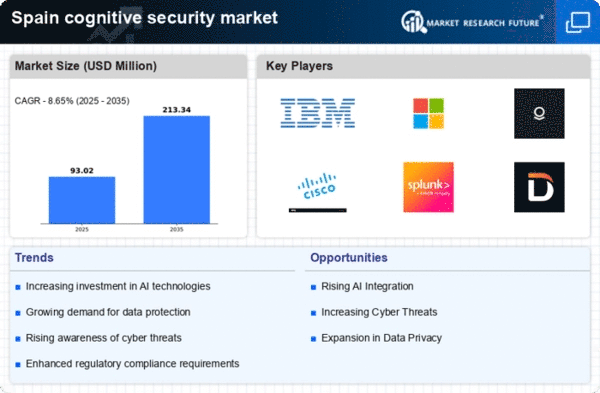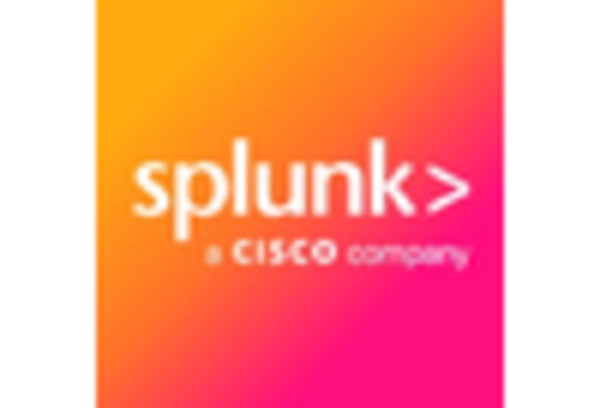Rising Cyber Threats
The cognitive security market in Spain is experiencing growth due to the increasing frequency and sophistication of cyber threats. Organizations are recognizing the need for advanced security measures to protect sensitive data and maintain operational integrity. In 2025, it is estimated that cybercrime could cost businesses globally over $10 trillion annually, prompting Spanish companies to invest in cognitive security solutions. This market is projected to grow at a CAGR of 20% from 2025 to 2030, driven by the urgency to mitigate risks associated with data breaches and cyberattacks. As a result, The cognitive security market is becoming a critical component of organizational strategy in Spain. Businesses are seeking innovative technologies to enhance their security posture.
Shift Towards Remote Work
The shift towards remote work in Spain has created new challenges for cybersecurity, thereby influencing the cognitive security market. As more employees work from home, organizations are compelled to enhance their security frameworks to protect remote access points. In 2025, it is projected that remote work will account for 30% of the workforce in Spain, necessitating the adoption of cognitive security solutions that can secure distributed environments. This trend is prompting businesses to invest in technologies that provide real-time threat detection and response capabilities, ensuring that remote operations remain secure. Consequently, the cognitive security market is poised for growth as organizations adapt to the evolving landscape of work.
Technological Advancements
Technological advancements play a pivotal role in shaping the cognitive security market in Spain. The integration of artificial intelligence (AI) and machine learning (ML) into security systems is enabling organizations to detect and respond to threats more effectively. In 2025, the market for AI-driven security solutions is expected to reach €5 billion in Spain, reflecting a growing reliance on intelligent systems for threat analysis and incident response. These technologies not only enhance the efficiency of security operations but also reduce the time required to identify and neutralize potential threats. Consequently, the cognitive security market is evolving rapidly, as businesses adopt cutting-edge solutions to stay ahead of emerging cyber risks.
Increased Regulatory Pressure
In Spain, the cognitive security market is influenced by heightened regulatory pressure surrounding data protection and privacy. The implementation of stringent regulations, such as the General Data Protection Regulation (GDPR), has compelled organizations to prioritize compliance and invest in robust security measures. As of 2025, approximately 70% of Spanish companies report that regulatory compliance is a key driver for their investment in cognitive security solutions. This trend indicates a shift towards proactive security strategies, where businesses are not only focused on protecting their assets but also on ensuring adherence to legal requirements. The cognitive security market is thus positioned to grow as organizations seek to align their security frameworks with evolving regulatory standards.
Growing Awareness of Security Risks
The growing awareness of security risks among businesses in Spain is significantly impacting the cognitive security market. As organizations face increasing scrutiny from stakeholders regarding their security practices, there is a heightened demand for comprehensive security solutions. Surveys indicate that over 60% of Spanish enterprises consider cybersecurity a top priority in their strategic planning. This awareness is driving investments in cognitive security technologies, as companies aim to safeguard their reputations and maintain customer trust. The cognitive security market is likely to expand as organizations recognize the importance of integrating advanced security measures into their operations to address potential vulnerabilities.
















